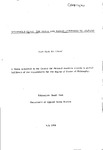'HOUSEHOLD CLASS. THE STATE AND PUBLIC ATTITUDES TO WELFARE'
| dc.contributor.author | Hyde, Mark | |
| dc.contributor.other | Faculty of Arts, Humanities and Business | en_US |
| dc.date.accessioned | 2013-09-24T12:13:53Z | |
| dc.date.available | 2013-09-24T12:13:53Z | |
| dc.date.issued | 1990 | |
| dc.identifier | NOT AVAILABLE | en_US |
| dc.identifier.uri | http://hdl.handle.net/10026.1/1933 | |
| dc.description.abstract |
Two specific shifts have occurred in the sectoral bases of welfare provision in the UK since the last war. The first involved in establishment of collective state provision whilst the second has involved a significant expansion of owner occupation. These developments have been interpreted at various times as signifying substantial changes in the nature of British society, particularly in the way that they are alleged to have attenuated class based social divisions and patterns of consciousness. In contemporary debates, owner occupation is alleged to have generated a conservative domestic oriented attitudinal disposition among manual households. Further, such households are held to be profoundly disaffected from state welfare as a result of their experiences as clients in this sector. The Plymouth study, which is reported below, was concerned with public attitudes to welfare. More specifically, its aim was to generate a data base which would enable the relative significance of sectoral patterns of welfare and household class as factors which influence the pattern of public attitudes to issues in social policy to be assessed. This aim was implemented by administering a structured questionnaire to a sample of 150 households in Plymouth. Subsequent empirical and conceptual analyses generated three conclusions. First, people are dissatisfied with the experience of state welfare but it is the distributive impact of welfare which is of the greatest significance in the calculations of the average household. Second, sectoral patterns of welfare do influence public perceptions of issues in social policy, but in a modest and specific way. Third, household class remains the most significant determinant of access to welfare, public or private, and because of this, the most significant influence on the pattern of public attitudes to welfare. | en_US |
| dc.language.iso | en | en_US |
| dc.publisher | University of Plymouth | en_US |
| dc.title | 'HOUSEHOLD CLASS. THE STATE AND PUBLIC ATTITUDES TO WELFARE' | en_US |
| dc.type | Thesis | |
| plymouth.version | Full version | en_US |
| dc.identifier.doi | http://dx.doi.org/10.24382/1548 | |
| dc.identifier.doi | http://dx.doi.org/10.24382/1548 |
Files in this item
This item appears in the following Collection(s)
-
01 Research Theses Main Collection
Research Theses Main


